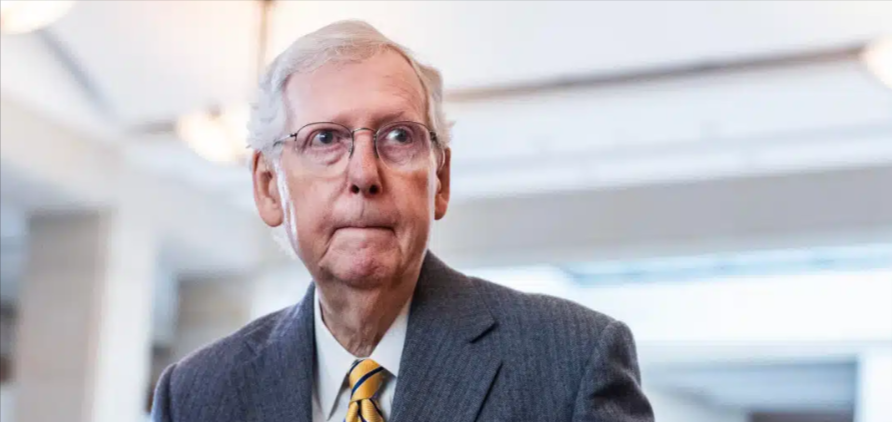McConnell Takes Issue With Trump On Govt Shutdown: ‘Always A Bad Idea’

The federal government is on the brink of a shutdown, and Senate Minority Leader Mitch McConnell is publicly opposing former President Donald Trump’s stance.
McConnell disagrees with Trump’s push for a shutdown unless the Safeguard American Voter Eligibility (SAVE) Act is incorporated into a temporary spending bill.
"A government shutdown is always a bad idea — at any time," McConnell remarked at the Capitol when questioned on the matter. He added, "I think we first have to see what the House sends us. And, of course, how to handle that comes down to [Senate Majority Leader Chuck Schumer]. The first step ought to be what comes out of the House, and I think we don’t know right now."
The Senate leader was also noncommittal regarding Speaker Mike Johnson's (R-La.) plan to introduce a continuing resolution this week, extending government funding until March, with the SAVE Act attached. This proposal would require proof of citizenship for voter registration in federal elections, according to The Hill.
Despite growing opposition within his party, Johnson continues to push the plan, which could only fail if four Republicans defect.
Trump weighed in on the issue on Tuesday, suggesting that Republicans should not support the budget if voter security measures like the SAVE Act aren’t included. "If Republicans in the House, and Senate, don’t get absolute assurances on Election Security, THEY SHOULD, IN NO WAY, SHAPE, OR FORM, GO FORWARD WITH A CONTINUING RESOLUTION ON THE BUDGET. THE DEMOCRATS ARE TRYING TO ‘STUFF’ VOTER REGISTRATIONS WITH ILLEGAL ALIENS. DON’T LET IT HAPPEN – CLOSE IT DOWN!!!" Trump posted on social media.
While some Senate Republicans back Johnson’s initial proposal, others are uncertain about the duration of the stopgap measure. Senate Republican appropriator Susan Collins (R-Maine) told reporters she preferred a resolution that expires in December to avoid burdening the next president, regardless of party, with a budget decision in their first 100 days.
Earlier this year, McConnell made waves when he asserted that he has no plans to leave the Senate, despite planning to step down as party leader. He also emphasized his focus on combating the "isolationist movement" within the GOP. Speaking with WHAS radio host Terry Meiners, McConnell said, "I’m not leaving the Senate," and vowed to counter GOP efforts to scale back U.S. support for allies like Israel and Ukraine.
McConnell defended continued U.S. support for Ukraine, noting, “The symbol, lately, is ‘are we gonna help Ukraine or not?’ And I think it’s extremely important that we do that.” He highlighted the U.S. financial aid to Ukraine in its fight against Russia, arguing that the conflict is critical to preventing further Russian advances on NATO allies.
Kentucky Senator Rand Paul, an outspoken critic of McConnell, has long opposed foreign interventions. McConnell addressed their differences, saying, "Paul would be the first one to say that he’s an isolationist. He has been all along. This is not anything new for him. And he and I have always disagreed on this kind of issue."
Several GOP senators are already looking ahead to a post-McConnell era. They’ve grown frustrated with his leadership style and anticipate a change once he steps down. McConnell recently announced he would leave his leadership role by November but plans to continue serving until his term ends in January 2027.
Republicans like John Cornyn of Texas and John Thune of South Dakota have already expressed interest in running for the Senate GOP leadership, with Rick Scott of Florida reportedly considering a bid as well. Senator Ron Johnson of Wisconsin noted that the party’s anti-establishment wing has yet to rally around a specific candidate, but conversations are ongoing.